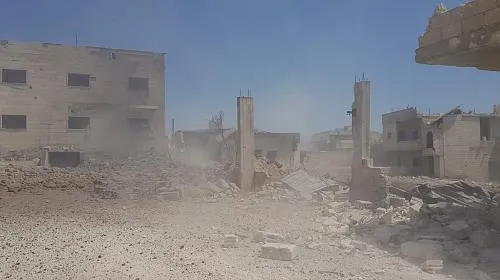Amman, 30 May 2019 – The spike in violence in northwest Syria has forced CARE International to suspend some of its aid provision, including at healthcare facilities and community centers for women and girls. Two CARE-supported basic obstetric health facilities, that serve some 180 women on a daily basis, each sustained damage for the second time this month, rendering them both inoperable, when a missile struck 10 meters away from the first health center on Tuesday another missile landed 50 meters away from the second on Thursday.
“The last five weeks have been characterized by indiscriminate bombing on civilians and civilian infrastructure in northwest Syria. Our healthcare facilities have been damaged and suspended due to the hostilities, affecting hundreds of women, who are in dire need of basic maternal healthcare. All parties to the conflict are legally bound to comply with International Humanitarian Law. We call on them to spare hospitals and healthcare centers, as they are fundamentally and legally obliged,” said Aleksandar Milutinovic, CARE’s Syria Country Director.
Three CARE-supported reproductive health facilities and another two community centers for women and girls have been affected in southern Idlib and Aleppo governorates. The five facilities served an average of 8,500 women per month. They are part of the United Nations Humanitarian Deconfliction Mechanism, which informs the Coalition Forces, the Republic of Turkey and the Russian Federation’s military forces of humanitarian static locations and humanitarian movements to mitigate the risks of being targeted or hit by an airstrike.
“The shelling has concentrated on service centers such as bakeries, health centers, educational facilities and places of worship, as well as residential areas. Many of these have stopped operating completely or partially, because of the risk of shelling. This has led to increased displacement, without the availability of shelters. People are sheltering under olive trees, in the open or on roads,” said Jamal, who works for CARE International in Idlib.
According to the UN, heavy shelling and aerial bombardment have resulted in the confirmed deaths of more than 160 civilians and the displacement of some 270,000 people in May. A total of 21 attacks on healthcare facilities have been reported by the World Health Organization, since April 28th. Fear of being attacked has led to at least 50 health facilities, including the 21 attacked, to either partially or totally suspend services. Some 25 schools are reported to have also been impacted by the violence, as well as markets and at least three sites for displaced people.
“We are witnessing villages become empty of their residents. Our Syrian partner organizations do not have the capacity to scale up at the current rate of displacement. The response is stretched. These humanitarian workers are civilians with families and children. They have also become displaced, resulting in further disruption to the aid response. Civilians must be protected to prevent a humanitarian catastrophe from unfolding right before us,” adds Milutinovic.
Rana, 29, is the Director of a CARE-supported center for women in Idlib, run by its partner Syrian organization, Women Now. “My husband left with our 18-month-old daughter and I have not seen them for a week. I stayed here with my 8-month-old son because of my job. I am packing some basic items for us to leave this area when the airplanes and shelling stop. There is no safe place left in Idlib. Most people are dying in their houses.”
Since 3 May 2019, CARE has reached over 70,000 individuals in northwest Syria, with clean drinking water, food rations, mobile health clinics, psychosocial support activities, personal hygiene items, cash assistance, shelter rehabilitation and makeshift shelter items, including plastic sheets, mattresses and blankets. As the humanitarian situation continues to deteriorate, CARE and the organisations it partners with in Syria will be scaling up the humanitarian response further in the coming weeks. CARE will continue to monitor the situation and work with its local partner organisations to ensure that the aid response is timely and coordinated.
Notes to editors:
- Since the start of the Syria crisis until the end of January 2019, CARE and its partners have reached more than 4.7 million people. We are responding to the crisis in Syria through a network of local partners, distributing food and non-food items, clean water, clothes, blankets, cash, rehabilitating collective shelters, and extending psycho-social support. We also work with people to restore livelihoods, particularly agriculturally based ones, protect maternal health, and repair small infrastructure.
- For media queries please contact: Vanessa Parra, +1 917-525-0590, vanessa.parra@care.org

